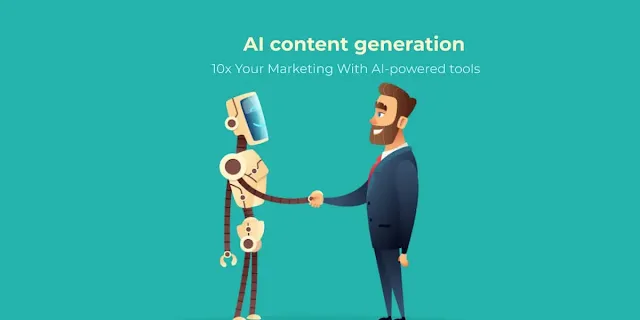In the ever-evolving landscape of digital marketing, staying ahead of the curve is not just an advantage; it's a necessity. As we look towards the future, one trend stands out as a game-changer: AI-driven content marketing. Artificial Intelligence (AI) is revolutionising the way businesses create, deliver, and analyze content, and it's redefining the rules of engagement in the digital advertising realm.
The Power of AI in Content Marketing:
Artificial Intelligence encompasses various technologies, including machine learning, natural language processing, and predictive analytics, that collectively enhance content marketing in several ways:
Data-Driven Insights:
AI can analyze vast datasets and extract actionable insights. It identifies consumer behaviour patterns, helping marketers understand what content resonates with their audience.
Personalization:
AI enables hyper-personalization. It tailors content based on user preferences, location, and browsing history, delivering a more relevant and engaging experience.
Content Creation:
AI tools can generate content, from articles to product descriptions. While it might not replace human writers, it significantly speeds up content production.
Chatbots and Customer Support:
AI-driven chatbots provide instant responses and can handle routine customer inquiries, improving user experiences.
Predictive Analytics:
AI predicts trends, helping marketers anticipate what content will be popular in the future. This foresight guides content strategies.
Benefits of AI-Driven Content Marketing
Enhanced Efficiency:
AI automates time-consuming tasks, allowing marketers to focus on strategy and creativity.
Improved Customer Experiences:
Personalised content and chatbots create more interactive and satisfying experiences.
Cost Savings:
Automated content creation and customer support reduce costs.
Better Decision-Making:
Data-driven insights lead to informed marketing decisions.
The Challenges
While AI-driven content marketing offers immense potential, it comes with challenges:
Quality Control: AI-generated content may lack the human touch and originality, requiring careful monitoring.
Privacy Concerns: The extensive use of data can raise privacy issues if not handled ethically.
Learning Curve: Implementing AI requires learning and adapting to new technologies, which can be a hurdle for some organisations.
AI and SEO
AI is also revolutionising Search Engine Optimization (SEO). Google's algorithms, for instance, have integrated AI to deliver more accurate search results. AI helps marketers understand how these algorithms work, ensuring content aligns with ranking factors.
The Future Beckons
AI-driven content marketing is not a passing trend; it's the future. As AI technologies continue to advance, marketers who embrace these tools will gain a competitive edge. However, human creativity and oversight remain vital. AI should complement, not replace, human input.
The future of digital advertising belongs to those who can harness the power of AI to create compelling content, deliver personalised experiences, and optimise their strategies based on data-driven insights. In this exciting era, success will be defined by the marriage of technology and human ingenuity, ensuring that businesses engage their audiences effectively and remain at the forefront of the digital advertising landscape.
Pros and Cons of AI-Driven Content Marketing:
This table provides a quick overview of the advantages and challenges associated with AI-driven content marketing.
Pros of AI-Driven Content Marketing:
Enhanced Efficiency:
AI automates repetitive tasks, allowing marketers to focus on strategy and creativity.
Improved Customer Experiences:
AI enables hyper-personalization, leading to more engaging and satisfying user experiences.
Cost Savings:
Automated content creation and customer support can significantly reduce operational costs.
Data-Driven Decision-Making:
AI provides data-driven insights, helping marketers make informed decisions about content strategies.
Content Generation:
AI tools can speed up content production, saving time and resources.
Cons of AI-Driven Content Marketing:
Quality Control:
AI-generated content may lack the human touch and originality, necessitating careful monitoring and editing.
Privacy Concerns:
The extensive use of user data to personalise content raises privacy concerns if not managed ethically.
Learning Curve:
Implementing AI technologies requires organisations to learn and adapt, which can be a challenge for some.
AI Limitations:
AI has limitations in understanding context and nuances, which can affect content quality.
Dependency on Data:
AI heavily relies on data, which means that without sufficient data, AI-driven strategies may not be as effective.
Initial Costs:
Implementing AI solutions can have initial setup and integration costs, which might be a barrier for smaller businesses.
AI-driven content marketing offers tremendous potential, but it also presents challenges. Striking the right balance between automation and human creativity, ensuring ethical data use, and adapting to new technologies will be crucial for businesses aiming to leverage the benefits of AI in their digital advertising efforts.





